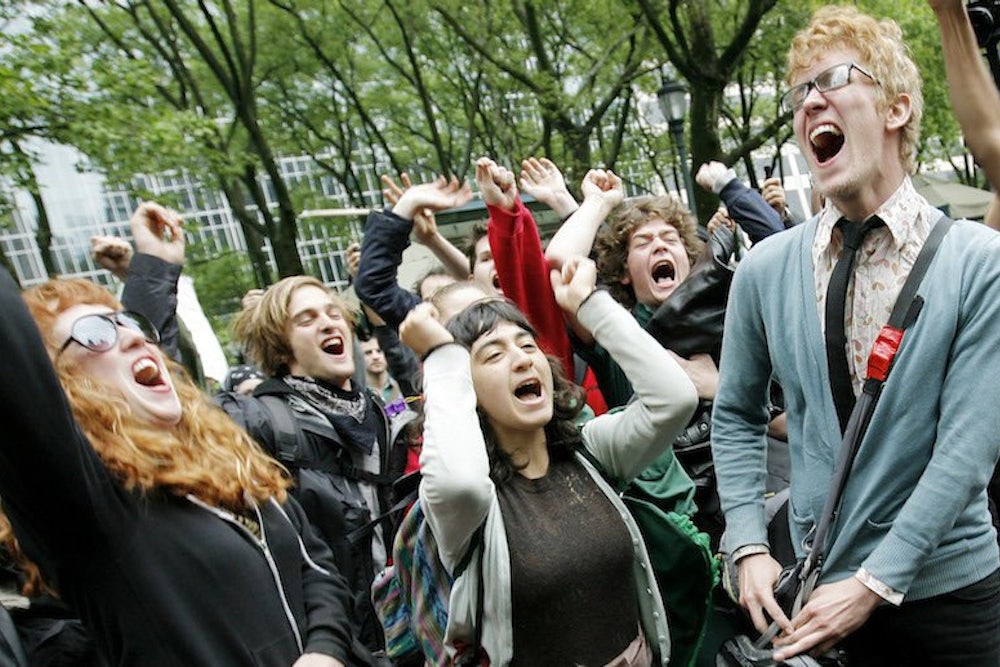Don't get too smug, millennials. Sure you might be more diverse, more open-minded, and more empathetic than your predecessors. But that doesn't mean you're some paragon of virtue and harmony. If anything, you're pessimistic and still significantly divided on race and religion.
Those are the findings of yet another study, published today, attempting to decipher just how young people tick on sexuality, religion, morality, and politics. A nonpartisan nonprofit group called the Public Religion Research Institute (PRRI), produced the study, titled “How Race and Religion Shape Millennial Attitudes on Sexuality and Reproductive Health,” by surveying 2,315 millennial adults (i.e., people aged 18 to 35) in February.
“One of the things that stands out as a big picture finding is that millennials are a little reluctant to make black and white moral pronouncements about issues,” said Robert P. Jones, the CEO of PRRI. Participants did have the option to refuse to answer questions or select “other” in response to moral questions, indicating that the lack of resolute stances on moral questions is not just indecisiveness. “There’s a kind of complexity to millennial thinking,” Jones said. “Particularly on these sexuality issues, millennials take a much more situationist approach.”
For example, millennials’ view of abortion mirrors that of the general population, but they are hesitant to label themselves exclusively pro-life (25 percent) or pro-choice (27 percent). Rather, 27 percent of millennials said both labels describe them equally well, while 22 percent said neither label described them well. Additionally, 55 percent of millennials said some health care professionals in their community should provide legal abortions, and 56 percent oppose making it more difficult for a woman to get an abortion.
Jones said that politicians and political parties looking to appeal to millennial voters might note millennials' tendency consider situations in context. Politicians who run campaigns that draw hardline moral positions, he said, will be running counter to millennial sensibilities.
Republicans, many of whom have taken hardline positions on abortion, gay marriage, and climate change, should take heed, as the survey finds the GOP is already struggling to appeal to millennials. It found only 17 percent of millennials identify as Republican, and of those, 76 percent also identified as white. True to their trend, 47 percent of millennials claimed to be political independents.
For broader coalitions among millennials, look to accessible and affordable contraception. Only 9 percent of millennials said that using contraception is morally wrong, and 58 percent said that privately owned corporations should be required to provide employees with healthcare plans that cover contraception. Eighty-one percent of millennials also favor increasing access to contraception for women who can’t afford it.
Almost a quarter of millennials said they received no sex ed classes in middle or high school. Perhaps as a result, two-thirds of millennials surveyed said they favor teaching comprehensive sex ed classes in public schools.
But before millennials start humble-bragging about the nuance of their progressive moral character, the PRRI study shows major schisms on race and religion. On a question that asked generally about the status of the country, 53 percent of millennials said the country has gotten seriously off on the wrong track, a pessimism Jones attributes to worries over economic and job prospects. That figure, though, broke hard along racial lines. While 64 percent of white millennials said the country was on the wrong track, 71 percent of black millennials said the country was headed in the right direction.
Another finding that surprised Jones was the prevalence of sexual assault for many millennials. Seventy-three percent of millennials said that sexual assault is somewhat or very common on college campuses, and 34 percent of millennial women report having a close family member or friend who has been sexually assaulted. “We also had a majority saying sexual assault was very common in high schools,” Jones said—especially among black millennial women, 70 percent of whom agreed with that assessment. “I think that was a surprising and sort of disturbing finding from the survey.”
There was, however, evidence that millennials are fair-minded and hopeful. Forty-seven percent of them acknowledge that transgender people face heavy stigma in their communities; most millennials agree that discrimination against women in the American workplace remains a significant problem; and whatever their Tinder habits, 71 percent of millennials still believe in marriage.
“Part of what marks this generation is being willing to think empathetically and put themselves in another person’s situations,” Jones said. “That’s kind of something different.”
